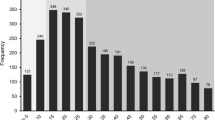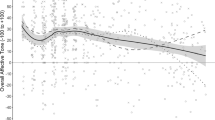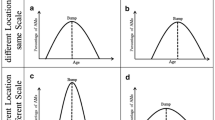Abstract
The present study investigated autobiographical memories of younger, middle-aged and older adults for the events that made them the happiest and the saddest in their lives. Participants generated these memory types and provided ratings about how positive and how negative the memory makes them feel when they currently think about it, and the positivity of the emotional content of the memory. Participants provided the age at which the event happened and rated the importance and effectiveness of the event in who they have become presently, and their perceived control over the event. Results provided supporting evidence for the positivity effect, by showing that older adults felt more positive about their memories. Middle-aged adults’ ratings resembled older adults’ for the happiest and younger adults’ for the saddest memories. Two young independent raters rated all descriptions of older adults’ memories. Results showed that young raters’ positive emotion ratings were lower than older adults, for both the happiest and the saddest memories. This result indicated that older adults do not access less negatively emotional memories or describe the memories more positively, but they just evaluate these memories more positively. Results showed a reminiscence bump for the happiest but not for the saddest memories, supporting the predictions of the Life Script Account. Additionally, results provided partial and rather weak support for the Life Story Account in younger and middle-aged adults, but not in older adults. The results indicate that older adulthood may be characterized by a more positive evaluation of life experiences.


Similar content being viewed by others
Notes
Based on an alpha level of .05, we report marginally significant results as well. Research shows an increased tendency to report such results in articles in the last decade (for a discussion, see Pritschet et al. 2016). However, we interpret these marginally significant results cautiously in the discussion.
For the t-test comparisons in middle-aged adults, Levene’s Test was significant, and thus the values with non-equal variance assumption are reported.
References
Akça-Kalem, Ş., Öktem, Ö., & Emre, M. (2002). Kısa Blessed oryantasyon-bellek- konsantrasyon testi (BOMC) ve standardize mini mental test (SMMT) betimsel istatistik değerlerinin bir normal erişkin Türk örnekleminde saptanması. Nöropsikiyatri Arşivi, 39, 95–102.
Berntsen, D., & Rubin, D. C. (2002). Emotionally charged autobiographical memories across the life span: The recall of happy, sad, traumatic and involuntary memories. Psychology and Aging, 17(4), 636–652. https://doi.org/10.1037/0882-7974.17.4.636.
Berntsen, D., & Rubin, D. C. (2004). Cultural life scripts structure recall from autobiographical memory. Memory & Cognition, 32(3), 427–442. https://doi.org/10.3758/BF03195836.
Blanchard-Fields, F., Jahnke, H. C., & Camp, C. (1995). Age differences in problem-solving style: The role of emotional salience. Psychology and Aging, 10(2), 173–180. https://doi.org/10.1037/0882-7974.10.2.173.
Buckner, R. L. (2004). Memory and executive function in aging and AD: multiple factors that cause decline and reserve factors that compensate. Neuron, 44, 195–208. https://doi.org/10.1016/j.neuron.2004.09.006.
Carstensen, L. L., & Mikels, J. A. (2005). At the intersection of emotion and cognition: Aging and the positivity effect. Current Directions in Psychological Science, 14(3), 117–121. https://doi.org/10.1111/j.0963-7214.2005.00348.x.
Carstensen, L. L., Pasupathi, M., Mayr, U., & Nesselroade, J. R. (2000). Emotional experience in everyday life across the adult life span. Journal of Personality and Social Psychology, 79(4), 644–655. https://doi.org/10.1037/0022-3514.79.4.644.
Carstensen, L. L., Fung, H. H., & Charles, S. T. (2003). Socioemotional selectivity theory and the regulation of emotion in the second half of life. Motivation and Emotion, 27(2), 103–123. https://doi.org/10.1023/A:1024569803230.
Charles, S. T., & Carstensen, L. L. (2007). Emotion regulation and aging. In J. J. Gross (Ed.), Handbook of emotion regulation (pp. 307–327). New York: The Guilford Press.
Charles, S. T., Reynolds, C. A., & Gatz, M. (2001). Age-related differences and change in positive and negative affect over 23 years. Journal of Personality and Social Psychology, 80(1), 136–151. https://doi.org/10.1037/0022-3514.80.1.136.
Charles, S. T., Mather, M., & Carstensen, L. L. (2003). Aging and emotional memory: The forgettable nature of negative images for older adults. Journal of Experimental Psychology: General, 132(2), 310–324. https://doi.org/10.1037/0096-3445.132.2.310.
Comblain, C., D'Argembeau, A., & Van der Linden, M. (2005). Phenomenal characteristics of autobiographical memories for emotional and neutral events in older and younger adults. Experimental Aging Research, 31(2), 173–189. https://doi.org/10.1080/03610730590915010.
Craik, F. I. M. (2000). Age-related changes in human memory. In D. C. Park & N. Schwarz (Eds.), Cognitive aging: A primer (pp. 75–92). New York: Psychology Press.
Craik, F. I. M., & Byrd, M. (1982). Aging and cognitive deficits. In F. I. M. Craik & S. Trehub (Eds.), Aging and cognitive processes (pp. 191–211). Boston: Springer.
Demiray, B., Gülgöz, S., & Bluck, S. (2009). Examining the life story account of the reminiscence bump: Why we remember more from young adulthood. Memory, 17(7), 708–723. https://doi.org/10.1080/09658210902939322.
Erdoğan, A., Baran, B., Avlar, B., Taş, A. Ç., & Tekcan, A. İ. (2008). On the persistence of positive events in life scripts. Applied Cognitive Psychology, 22(1), 95–111. https://doi.org/10.1002/acp.1363.
Erikson, E. H., & Erikson, J. M. (1998). Major stages in psychosocial development. In E. H. Erikson (Ed.), The life cycle completed (pp. 55–82). New York: W. W. Norton & Company.
Ford, J. H., DiBiase, H. D., Ryu, E., & Kensinger, E. A. (2018). It gets better with time: Enhancement of age-related positivity effect in the six months following a highly negative public event. Psychology and Aging, 33(3), 419–424. https://doi.org/10.1037/pag0000250 supp (Supplemental).
Fung, H. H., & Carstensen, L. L. (2003). Sending memorable messages to the old: Age differences in preferences and memory for advertisements. Journal of Personality and Social Psychology, 85(1), 163–178. https://doi.org/10.1037/0022-3514.85.1.163.
Gallo, D. A., Korthauer, L. E., McDonough, I. M., Teshale, S., & Johnson, E. L. (2011). Age-related positivity effects and autobiographical memory detail: Evidence from a past/future source memory task. Memory, 19(6), 641–652. https://doi.org/10.1080/09658211.2011.595723.
Gatz, M., & Karel, M. J. (1993). Individual change in perceived control over 20 years. International Journal of Behavioral Development, 16(2), 305–322. https://doi.org/10.1177/016502549301600211.
Gençöz, T. (2000). Positive and negative affect schedule: A study of validity and reliability. Türk Psikoloji Dergisi, 15(46), 19–28. Retrieved from http://bproxy.bahcesehir.edu.tr:2062/login.aspx?direct=true&db=psyh&AN=2001-17472-002&site=ehost-live.
Gil, S., & Gilbar, O. (2001). Hopelessness among cancer patients. Journal of Psychosocial Oncology, 19(1), 21–33. https://doi.org/10.1300/J077v19n01_02.
Gluck, J., & Bluck, S. (2007). Looking back across the life span: A life story account of the reminiscence bump. Memory & Cognition, 35(8), 1928–1939. https://doi.org/10.3758/BF03192926.
Gross, J. J. (1998). The emerging field of emotion regulation: An integrative review. Review of General Psychology, 2(3), 271–299. https://doi.org/10.1037/1089-2680.2.3.271.
Gross, J. J., & John, O. P. (2003). Individual differences in two emotion regulation processes: Implications for affect, relationships, and well-being. Journal of Personality and Social Psychology, 85(2), 348–362. https://doi.org/10.1037/0022-3514.85.2.348.
Gross, J. J., Carstensen, L. L., Pasupathi, M., Tsai, J., Skorpen, C., & Hsu, A. Y. C. (1997). Emotion and aging: Experience, expression, and control. Psychology and Aging, 12(4), 590–599. https://doi.org/10.1037/0882-7974.12.4.590.
Katzman, R., Brown, T., Fuld, P., Peck, A., Schechter, R., & Schimmel, Η. (1983). Validation of a short orientation-memory-concentration test of cognitive impairment. American Journal of Psychiatry, 140, 734–739. https://doi.org/10.1176/ajp.140.6.734.
Kennedy, Q., Mather, M., & Carstensen, L. L. (2004). The role of motivation in the age-related positivity effect in autobiographical memory. Psychological Science, 15(3), 208–214. https://doi.org/10.1111/j.0956-7976.2004.01503011.x.
Klencklen, G., Després, O., & Dufour, A. (2012). What do we know about aging and spatial cognition? Reviews and perspectives. Ageing Research Reviews, 11(1), 123–135. https://doi.org/10.1016/j.arr.2011.10.001.
Lang, F. R., & Carstensen, L. L. (2002). Time counts: Future time perspective, goals, and social relationships. Psychology and Aging, 17(1), 125–139. https://doi.org/10.1037/0882-7974.17.1.125.
Lustig, C., Hasher, L., & Zacks, R. T. (2007). Inhibitory deficit theory: Recent developments in a "new view". In D. S. Gorfein & C. M. MacLeod (Eds.), The place of inhibition in cognition (pp. 145–162). Washington, DC: American Psychological Association.
Mather, M., & Carstensen, L. L. (2003). Aging and attentional biases for emotional faces. Psychological Science, 14(5), 409–415. https://doi.org/10.1111/1467-9280.01455.
Moylan, K., & Lin, T. L. (Eds.). (2004). The Washington manual geriatrics subspecialty consult. Philadelphia: Lippincott Williams & Wilkins.
Orgeta, V. (2009). Specificity of age differences in emotion regulation. Aging & Mental Health, 13(6), 818–826. https://doi.org/10.1080/13607860902989661.
Parks, S. L., & Dollinger, S. (2014). The positivity effect and auditory recognition memory for musical excerpts in young, middle-aged, and older adults. Psychomusicology: Music, Mind, and Brain, 24(4), 298–308. https://doi.org/10.1037/pmu0000079.
Pasupathi, M. (2001). The social construction of the personal past and its implications for adult development. Psychological Bulletin, 127(5), 651–672. https://doi.org/10.1037/0033-2909.127.5.651.
Phifer, J. F. (1990). Psychological distress and somatic symptoms after natural disaster: Differential vulnerability among older adults. Psychology and Aging, 5(3), 412–420. https://doi.org/10.1037/0882-7974.5.3.412.
Phillips, L. H., Henry, J. D., Hosie, J. A., & Milne, A. B. (2006). Age, anger regulation and well-being. Aging & Mental Health, 10(3), 250–256. https://doi.org/10.1080/13607860500310385.
Pritschet, L., Powell, D., & Horne, Z. (2016). Marginally significant effects as evidence for hypotheses: Changing attitudes over four decades. Psychological Science, 27(7), 1036–1042. https://doi.org/10.1177/0956797616645672.
Reed, A. E., & Carstensen, L. L. (2012). The theory behind the age-related positivity effect. Frontiers in Psychology, 3, 339. https://doi.org/10.3389/fpsyg.2012.00339.
Ritchie, T. D., Skowronski, J. J., Wood, S. E., Walker, W. R., Vogl, R. J., & Gibbons, J. A. (2006). Event self-importance, event rehearsal, and the fading affect bias in autobiographical memory. Self and Identity, 5(2), 172–195. https://doi.org/10.1080/15298860600591222.
Robertson, S. M. C., & Hopko, D. R. (2013). Emotional expression during autobiographical narratives as a function of aging: Support for the socioemotional selectivity theory. Journal of Adult Development, 20(2), 76–86. https://doi.org/10.1007/s10804-013-9158-6.
Ross, C. E., & Mirowsky, J. (2002). Age and the gender gap in the sense of personal control. Social Psychology Quarterly, 65(2), 125-145. https://doi.org/10.2307/3090097.
Rubin, D. C., & Berntsen, D. (2003). Life scripts help to maintain autobiographical memories of highly positive, but not highly negative, events. Memory & Cognition, 31(1), 1–14. https://doi.org/10.3758/BF03196077.
Rubin, D. C., & Schulkind, M. D. (1997). The distribution of autobiographical memories across the lifespan. Memory & Cognition, 25(6), 859–866. https://doi.org/10.3758/BF03211330.
Salthouse, T. A. (2000). Aging and measures of processing speed. Biological Psychology, 54(1–3), 35–54. https://doi.org/10.1016/S0301-0511(00)00052-1.
Shiota, M. N., & Levenson, R. W. (2009). Effects of aging on experimentally instructed detached reappraisal, positive reappraisal, and emotional behavior suppression. Psychology and Aging, 24(4), 890–900. https://doi.org/10.1037/a0017896.
Tekcan, A. I., Kaya-Kızılöz, B., & Odaman, H. (2012). Life scripts across age groups: A comparison of adolescents, young adults, and older adults. Memory, 20(8), 836–847. https://doi.org/10.1080/09658211.2012.710431.
Walker, W. R., & Skowronski, J. J. (2009). The fading affect bias: But what the hell is it for? Applied Cognitive Psychology, 23(8), 1122–1136. https://doi.org/10.1002/acp.1614.
Walker, W. R., Vogl, R. J., & Thompson, C. P. (1997). Autobiographical memory: Unpleasantness fades faster than pleasantness over time. Applied Cognitive Psychology, 11(5), 399–413. https://doi.org/10.1002/(SICI)1099-0720(199710)11:5<399::AID-ACP462>3.0.CO;2-E.
Watson, D., Clark, L. A., & Tellegen, A. (1988). Development and validation of brief measures of positive and negative affect: The PANAS scales. Journal of Personality and Social Psychology, 54(6), 1063–1070. https://doi.org/10.1037/0022-3514.54.6.1063.
Acknowledgement
We would like to thank Ebru Arslanhan, Pelin Alpay, Hümeyra Minel Aykut, Zeynep Karataş, Hande Deveci, Şeyma Hilal Kaanoğlu, Ecem Akgül and Melike Alyurt for their help with data collection and data entry. We also thank Aylin Topçu and Berk Erdinç for their contributions to data collection.
Datasets are available from the first author upon request.
Author information
Authors and Affiliations
Corresponding author
Ethics declarations
The authors state that there are no potential conflicts of interest about the manuscript. The study complies with the ethical standards of research involving human participants and informed consent was obtained from all participants. The study does not have financial support.
Ethical Approval
All procedures performed in this study involving human participants were in accordance with the ethical standards of the ethics board of the previous institution of the first author (Yeditepe University Humanities and Social Research Ethics Review Board, Document Reference Number: 75078252–9000-0045/289) and with the 1964 Helsinki declaration and its later amendments or comparable ethical standards.
Additional information
Publisher’s Note
Springer Nature remains neutral with regard to jurisdictional claims in published maps and institutional affiliations.
Rights and permissions
About this article
Cite this article
Ikier, S., Duman, Ç. The happiest and the saddest autobiographical memories and aging. Curr Psychol 41, 4907–4919 (2022). https://doi.org/10.1007/s12144-020-00993-w
Published:
Issue Date:
DOI: https://doi.org/10.1007/s12144-020-00993-w




